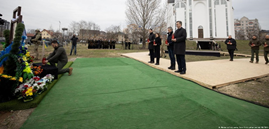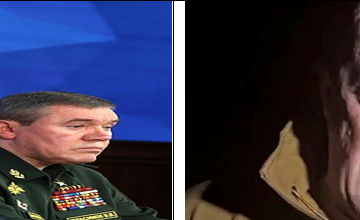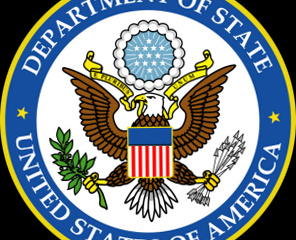Bucha marks one year since liberation

Ukraine on Friday marked one year since its forces liberated the Kyiv suburb of Bucha, with Russian troops leaving behind them the bodies of executed civilians strewn among burnt-out military vehicles in the streets.
President Volodymyr Zelenskyy attended a ceremony in Bucha alongside Croatian Prime Minister Andrej Plenkovic, Moldovan President Maia Sandu and Slovakian Prime Minister Eduard Heger.
“The battle for the foundation of the free world is taking place on Ukrainian land. We will definitely win. Russian evil will fall, right here in Ukraine and will not be able to rise again,” Zelenskyy said at the ceremony.
Ukrainian authorities estimate that around 400 bodies of civilians were found in Bucha. Two days after it was liberated by Ukrainian forces in 2022, Zelenskyy visited the town and described the killing of civilians as “genocide.”
On the one-year anniversary of the massacre, local residents recalled to DW their memories under occupation and how they are now seeking justice.
Bucha, which was home to 37,000 people before the war, is currently abuzz with construction workers rebuilding homes.
At the Saint Andrew church near Bucha’s town hall, where a mass grave had been dug during Russia’s occupation, municipal workers constructed a stage for Friday’s ceremony.
“It’s very important that we don’t forget the people who, unfortunately, are not with us today,” Archpriest Andriy, who runs the parish, told the AFP news agency.
“It is also important for us not to live in the past, but in the future. To live in the future, you must not only win (and) defeat the occupiers… but it is very important that evil is condemned. Criminals must be condemned, evil must be punished,” he said.
Lawyer tells DW Bucha probe a ‘process’ that will ‘take time’
Arie Mora, a lawyer at an NGO, the Ukrainian Legal Advisory Group, which is part of a coalition gathering and documenting war crimes in Ukraine, told DW that the process of investigating crimes committed in Bucha was ongoing but time consuming.
“Unfortunately this takes time; identifying suspects, gathering the evidence. So this is rather a process,” he said.
Mora explained that due to the difficulty of identifying the individual soldiers who may have committed the crimes, investigators tend to utilize the command responsibility concept in the International Criminal Law. The concept stipulates that those who issue the command can bear responsibility for the crime.
“But identifying the commanders is also something that we should definitely and are definitely looking into, going as high as we possibly can. This is something that can ensure justice for these crimes with a higher likelihood.”



